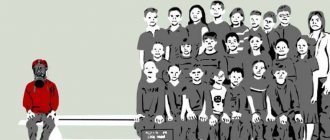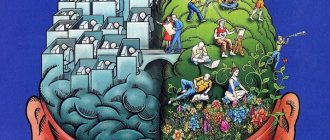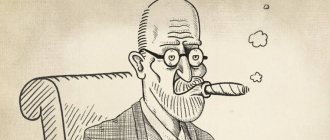Sages from the East say that human existence is destined by fate. Somerset Maugham compares life to a theater, where everyone has their own social role, but not everyone plays it as an encore.
What is your role in society
From the first minutes of birth, a person’s place in society is already prepared. The way a baby grows up is influenced by his environment. Some people completely obey the norms of their world. Others engage in antagonism with him in behavior. No individual is left outside the system.
Concept in psychology
Society is a mechanism that has a complex set of rules and relationships that have developed during its development and represents a certain set of values and attitudes. In this mechanism, everyone is a participant in the existence of a social group. Therefore, specific expectations are imposed on him - how he should behave, in accordance with the ideas of others about correct behavior.
What is a social role? In the first half of the 20th century, this quality was represented as a system of norms established by society. At the same time, it was also designated as a game where the individual learns the relevant laws and becomes part of society. Today we can say that this is an attempt by the individual to combine the individual with what is considered generally accepted.
Thus, this is the expectation of the surrounding reality that a person, as a bearer of a certain status, will adjust his behavior in accordance with it.
Each social role has a prescribed set of rights and responsibilities.
A duty is something a person does based on the norms of a social role, regardless of whether he likes it or not. Since duties are always accompanied by rights, fulfilling their duties in accordance with their social role, a person has the right to present his demands to his interaction partner. If there are no responsibilities in a relationship, then there are no rights. Rights and responsibilities are like two sides of the same coin - one is impossible without the other. Harmony of rights and responsibilities presupposes optimal fulfillment of a social role. Any imbalance in this ratio indicates poor assimilation of the social role. For example, often in cohabitation (the so-called civil marriage), a conflict arises at the moment when the partner is presented with the demands of the social role of the spouse.
The fulfillment of social roles involves conflicts and, as a consequence, psychological problems.
- Each individual has his or her own performance of generally accepted social roles. It is impossible to achieve complete agreement between a given standard and personal interpretation. Proper fulfillment of the requirements associated with the social role is ensured by a system of social sanctions. Often the fear of not meeting expectations leads to self-condemnation: “I’m a bad mother, a worthless wife, a disgusting daughter”...
- Personal-role conflict arises if the requirements of a social role contradict the life aspirations of the individual. For example, the role of a boss requires a person to have strong-willed qualities, energy, and the ability to communicate with people in various, including critical, situations. If a specialist lacks these qualities, he will not cope with his role. People say about this: “The hat doesn’t suit Senka.”
- When a person has several social roles with mutually exclusive requirements or he does not have the opportunity to fulfill his roles in full, inter-role conflict . At the heart of this conflict is the illusion that “the impossible is possible.” For example, a woman wants to be an ideal housewife and mother, while successfully managing a large corporation.
- If different representatives of a social group make different demands on the performance of one role, intra-role conflict . For example, a husband believes that his wife should work, but his mother believes that his wife should stay at home, raise children, and do housework. The woman herself thinks that it is important for a wife to develop creatively and spiritually. Staying inside a role conflict leads to personality destruction.
- Having matured, a person actively enters into the life of society, striving to take his place in it and satisfy personal needs and interests. The relationship between the individual and society can be described by the formula: society offers, the individual seeks, chooses his place, trying to realize his interests. At the same time, she shows and proves to society that she is in her place and will perform her assigned role well. The inability to choose a suitable social role for oneself leads to a refusal to perform any social functions - to self-elimination .
- For men, such psychological trauma is fraught with reluctance to have a wife and children, refusal to protect their interests; self-affirmation through humiliation of the defenseless, a tendency towards a passive lifestyle, narcissism and irresponsibility.
- For women, the lack of fulfillment of certain social roles leads to uncontrolled aggression not only towards others, but also towards themselves and their children, even to the point of abandoning motherhood.
What social roles exist: list
The life of an individual is diverse. Due to its numerous manifestations, the classification also has a huge variety of positions.
Firstly, in the hierarchy of human relationships there is a division according to:
- gender characteristics: man, woman;
- professions;
- age category: child, adult, elderly.
Secondly, they can be designated as public roles:
- husband, wife, mother, father;
- manager, leader;
- an outcast, rejected by society;
- pet, etc.
In the mechanism, an individual can perform several social roles. They are distributed officially or arise unexpectedly depending on life situations.
Thus, according to the charter signed at work, the boss will expect the employee to adhere to specific rules established by the company. And everyday phenomena make an individual a participant in events in which he did not even think of being involved.
How are social status and social role related?
Social maladjustment in psychology
Two people are enough to create a hierarchy. A group of people is already a cell where everyone has their own role. The diversity of groups is a social system in which not only interpersonal relationships are important, but also the ability of some to lead and others to obey.
Any society is a pyramid, where each step is assigned a certain rank (low, medium, high). They constitute the hierarchy to which the groups are subordinate. But even within a single stratum there is its own ranking, which determines the place of each member of the community.
Status – motivation to action
Social roles and statuses are interconnected. It is a person’s position in society that interprets the norms of his behavior and predetermines relationships with others. In other words, “what is allowed to Jupiter is not allowed to the Ox.”
In role-playing games, not everything is so simple - a person simultaneously has several statuses. Their totality is divided into:
- related;
- gender;
- political;
- economic;
- religious;
- professional.
Along with permanent and main statuses, there are temporary and episodic ones. At each rank the individual has a corresponding role. She does not occupy a dominant place in the hierarchy everywhere. The following example can be given as confirmation. The beloved father of the family, who has authority among his relatives, can be an inconspicuous “gray cog” in his own production.
Important! The discrepancy between statuses in different areas of one person’s activity leads to contradictions in all hierarchies, preventing the individual from fulfilling his role well.
In general, all statuses predetermine the characteristics of social relations. Ranks provide certain privileges and rights and indicate a range of responsibilities. They dictate the model of behavior. Therefore, a social role can be represented as a status function implemented within a particular society.
Species and types
The whole complex can be described by just five properties:
- Possible closeness of relationships between people. Between the interaction of teacher and student there arises subordination and communication standards established by the educational organization. But spouses or friends are connected much deeper.
- Acquisition method. There are requirements received due to circumstances beyond the individual’s control: gender, age. But there are those that a person achieves through effort: a position in the service, education.
- The scale of expressed feelings during contact between individuals. In relationships between seller and buyer or between colleagues, it is not customary to show strong emotions. Another thing is a family, where the emotional involvement in the lives of its members is greater.
- Conditions of interaction: presence or absence. A chef in a restaurant must prepare delicious food for customers, and a policeman must maintain order and ensure that people follow the laws. A woman in a family circle feeds her household, but she is not obliged to do this at a formal level.
- Motives and intentions. A businessman conducts his activities with the goal of making a profit. But if a clergyman sets such a task for himself, it will be perceived negatively, since society expects selfless actions from him.
Formalization
This characteristic describes interpersonal relationships between role holders. Some roles accompany formal relationships, while others, in turn, are informal.
There are roles in which a combination of both formal and informal relationships is acceptable. For example, the head of an enterprise hired his friend for the position of deputy.
Often, formal relationships have every chance of being disrupted by informal ones. This usually happens when a person is overly sentimental and sensitive, or is not well-educated enough to maintain subordination and tact.
What is the social role: characteristics
The positions occupied by an individual are characterized by four factors:
- Scale. Status is determined by the degree of interpersonal relationships. Let's take the example of interaction between spouses. There are many roles between them: feelings and responsibilities to the union. In terms of professions, a wife who is a doctor can cure her husband, and a husband who is an auto mechanic can repair his companion’s car. And if you come to the store to buy groceries, then the scope of contact between you and the seller is quite narrow - they give you the goods, and you have to pay for it.
- Receipt method. On this basis, social roles are those that are acquired naturally or through effort. The first ones are determined automatically and do not depend on our decisions: gender, age category. But to become a student, you go to university, to become a businessman, you open a business.
- Level of formality. Positions may be strictly regulated by institutions or remain independent. Relationships within a close social circle are considered informal, as they are based on friendly affection. But the contact between the policeman and the offender is fixed by law: decisions are made not depending on feelings, but as required by the law.
- Social roles are also related to motivation. The loader wants to buy his own car and therefore works 12 hours a day. And participants in charitable events strive to gain recognition from society or to make the surrounding reality much better. All this depends on the needs and intentions of people, on their views and values.
Types of roles
When it comes to role behavior, we usually talk about social roles, which, out of habit, refers to all the roles that a person plays in society. But in fact, along with the actual social ones, there are also interpersonal roles. The two species differ in many characteristics.
Social roles
Social roles are standardized and conventional. The word “conventional” in psychology refers to many social phenomena that are formed in the process of interaction between people. “Convention” is translated as “agreement,” and not only roles, but also norms of behavior can be conventional. We are, of course, not talking about a direct agreement; it is only in a children's play group that its participants directly agree on the rules of the game.
Typically, conventional norms or roles are formed over a long period of time, when stereotypes of behavior that are most convenient and effective in group activities are selected. These standards are reinforced and supported not only by public opinion and social control, but also by official documents or laws.
Most social roles in modern society have a centuries-old history, but new ones are constantly emerging, not yet fully formed. This is due to the emergence of new areas of activity, and therefore functions.
Along with simply social ones, there are also socio-demographic roles: husband, wife, father, mother, son, daughter, grandmother, etc. They are less standardized and are supported not only by formal laws, but also by customs and traditions. By the way, man and woman – gender roles – also refer to social roles. Their functions and behavioral stereotypes in society are largely biologically determined.
Interpersonal roles
Unlike impersonal social ones, interpersonal roles are associated with the individual characteristics of a person and his place in the system of interpersonal connections. These roles are also regulated not by formal laws, but by emotional relationships.
Each interpersonal role is, in fact, unique, but in the conditions of the long-term existence of social groups, the process of their typification occurs. That is, certain stereotyped ideas about the content of certain interpersonal roles are formed in the public consciousness. For example, in each class there is a “first beauty”, “bad guy”, “witty jester”, “cramming”, etc. Such patterns are close to the concept of “acting role”.
Despite the fact that interpersonal roles are not clear, they are more stable than social ones. After all, social roles are associated with functions, and it is enough for a person to change his functions in the group, and his role will change. A student, having graduated from a university, can become a teacher, and a daughter, as she gets older, can get married and also take on the role of a wife, and then a mother.
Changing an interpersonal role is not so easy because it is related to a person's personality. And it is precisely this that needs to be changed if you are not satisfied with your position in the group. But even in this case, those around you will retain the familiar image of your role for a long time. So, the “first beauty” by the 10th-11th grade can grow up and become a rather mediocre girl, but the attitude towards her in the class will remain. And a noted wit and jester, who has entertained his classmates for a long time, over time may begin to become burdened with his role. He would be glad to change it, but it doesn’t work out - no one takes him seriously.
The social roles played by one individual are varied, since a person is a member of different groups. Interpersonal roles are determined by individual, personal qualities, but they can also be different. Thus, a man who plays the role of a tyrant-tyrant in the family can be a modest, timid and even cowardly “errand boy” in the company of friends.
Social the role of a person is
Speaking about this definition, it is worth mentioning its structure:
- role expectation;
- performance of the role.
Absolute equality is never achieved between these characteristics. Society places hopes on an individual, and how he fulfills his responsibilities depends on his psychological characteristics and value system. A public place does not create a detailed model of actions and actions. The position provides a range of opportunities. And how he uses them constitutes the process of socialization and development within the system.
The social role of men in modern society
The male hunter brought the main wealth to the house (namely, food) and it depended on him alone whether his tribe would survive or die. The man had the role of a protector, since he was physically more powerful than the woman, due to constant physical activity. Simply put, the man was constantly “swinging” and forced to gain strength. Therefore, such a criterion as female passivity was formed. (The man was in charge). The social role of a woman was that she historically had to be the mistress of the house, raise and care for children, and “babysit” children.
A man is a hunter, breadwinner and protector; in the course of evolution, he grew physically and became more structured than a representative of the fair sex; he needs physical strength and endurance.
Briefly about the main social roles of a person in society: examples from life
Learning to follow the rules begins in early childhood:
- Parents teach the child what can and cannot be done, how to behave in different situations and with different people: mom and dad, elders, friends.
- Children gain insight into behavior patterns based on gender. The same actions cause different reactions. If a girl starts to cry, they calm her down, and in this case they explain to the boy that a future man should not do this.
- With age, the child masters the role of a student at school, a friend, or a member of a section.
- After receiving education, everyone takes on expectations in connection with their professional affiliation: journalist, doctor, driver.
What are they connected to?
The “standard” set of roles is associated with the main areas of a person’s life in society.
In psychology, a distinction is made between social and interpersonal types of roles.
Social are associated with a certain set of rights and responsibilities expected of a person, which, in the understanding of society, this status imposes on him:
- social status;
- professional affiliation, type of activity;
- gender, etc.
Interpersonal roles are individual and consist of specific relationships in a couple, group, community of people (for example, everyone’s favorite in the family).
Since each individual is a “carrier” of a large number of social roles associated with one status, the concept of a role set (complex) is highlighted in psychology.
Within the complex, there are typical social roles of the individual and those that arise depending on the situation.
Typical, basic social roles include those that form the backbone of an individual’s personality:
- his interaction in the family, with his immediate (“native”) social circle;
- belonging to a professional society, circle;
- socio-political activities and beliefs.
Unlike basic (permanent) social roles, situational ones arise spontaneously and end with a change in the “plot”.
So, for example, during one day a person manages to be a passenger, a driver, a buyer, or a pedestrian.
Impact on personality development
Mastering a new position in society radically affects the individual. The more positions he performs, the more he adapts to life in society. There are two factors in learning a new “position”: technical and semantic. The first involves how a person perceives and masters his responsibilities. The second is his attitude towards the hopes placed on him.
Ask a question
In any case, throughout his life, an individual takes on new roles related to age, profession, and interpersonal relationships. And personal growth or degradation depends on the degree of immersion in the role.
Role theory
Social role is a set of actions performed by a person in the social system and having a certain status.
Each social status implies the fulfillment of several social roles. A role set is a set of roles, the fulfillment of which is predetermined by one status. The higher the position a person occupies in the social hierarchy, the higher his social status and the more roles he has to perform.
Each role has its own type of implementation of social relations. Each role from the role set corresponds to a special manner of behavior. A role set forms a set of social relations. Predisposition, readiness for social relationships is called attitude.
With maximum fusion with the role, role identification is observed; minimal or average fusion leads to distancing from the role. Role identification is stronger the higher society evaluates status.
https://www.youtube.com/watch?v=upload
The role set characteristic of an individual is determined by many factors. One of the main factors is a person’s age. The period of adolescence is characterized by role intermediateness between the role of a child and the role of an adult. This gives rise to instability of social position. The young man gradually loses the status granted by his parental family and begins to achieve his own status and master new roles.
Can not understand anything?
Try asking your teachers for help
Pure role behavior is behavior based only on role and status prescriptions, which are not influenced by the characteristics of the situation or the personal characteristics of the subject.
The implementation of a social role occurs in different ways:
- role expectation, which provides for the behavior of an individual depending on the prescribed status and the expectations of the people around him;
- role performance, characterized by the actual behavior of the individual, which he correlates according to his status.
There is never a complete match between role expectations and performance. However, in individual behavior, both aspects are of great importance.
A person's social role is largely determined by what other people expect from him. Society sets a certain standard of behavior, and the fulfillment of a social role is personal in nature.
This happens precisely in interaction with society. As a child, an individual encounters ready-made models of behavior and observes the relationships of parents with each other and with friends and neighbors. This is how he gains his first experience of contacts by trying them on himself. The baby recognizes himself as a member of society.
Role-Related Behaviors and Conflicts
“Role essence” is a mechanism of the individual and his structure. Thus, his activities are primarily determined by his social status and prescribed duties. But often performing your repertoire is accompanied by difficulties. Not all actions are easy for people. In the process, a person may experience tension associated with difficulties in meeting the expectations of others or with a discrepancy between internal views and values with them.
Often two or more roles may be incompatible with each other. For example, a married student must satisfy the requirements of a wife and a student. Tension can be reduced in several ways. One of them is rationalization. This is protection from a negatively perceived situation through the most desirable attitudes. So, for example, American slave traders firmly believed that all individuals are equal. But slaves are property, so you shouldn’t think about their situation. The phenomenon appears in their eyes in such a way that role tension disappears.
The second method is separation. There are many clear illustrations in history when cruel rulers showed themselves to be exemplary and loving husbands and fathers. This “rebirth” also helps reduce conflict.
How to determine your position
This is quite easy to do. It is enough to try to “fit” yourself into the system of relations with society. Remember that the concept begins where the specific responsibilities are present:
- Children are required to obey their parents, and adults are required to help children.
- A pedestrian should take into account traffic signals and walk on the pedestrian area, and the driver should follow the traffic rules set forth by law.
- The student is required to attend lectures, pass sessions and behave correctly in class.
- A friend is expected to provide support and share hobbies and interests.
Due to the diversity of roles, an individual must constantly change his own behavior model. So, a professor at the university should be strict and all-knowing, and when he comes home and turns into a spouse and father, he shows care and love. These requirements are contradictory and it is often difficult for many to 100% comply with their positions.
Every social role has meaning and significance.
For society to function and develop normally, it is important that all its members master and fulfill social roles. Since behavior patterns are established and passed down from generation to generation in the family, let's look at family roles.
According to the study, the majority of men marry to have a permanent partner for sex and entertainment. In addition, for a man, a wife is an attribute of success that supports his status. Consequently, the meaning of the wife’s social role is to share the hobbies and interests of her husband in order to look decent at any age and at any period of life. If a man does not receive sexual satisfaction in marriage, he will have to look for a different meaning of marital relations.
The social role of the mother involves caring for the child: health, nutrition, clothing, home comfort and raising a full-fledged member of society. Often women in marriage replace the role of wife with the role of mother, and then wonder why the relationship is destroyed.
The social role of the father is to provide protection and security to his children, to be the highest authority in the children’s assessment of their actions, and to be able to maintain hierarchy.
The task of parents, both father and mother, is to help the child, while growing up, to form a personality capable of living and creating results in his life independently. To instill moral and spiritual standards, the foundations of self-development and stress resistance, to establish healthy models of relationships in the family and society.
Sociological research claims that most women get married in order to have the status of a married woman, a reliable rear for raising children in a full-fledged family. She expects admiration and openness in relationships from her husband. Consequently, the social role of a husband is to have a legally registered marriage with a woman, take care of his wife, and participate in raising children throughout their growing up period.
The social roles of adult daughters or sons imply an independent (financially independent) life from their parents. In our society, it is believed that children should take care of their parents at a time when they become helpless.











